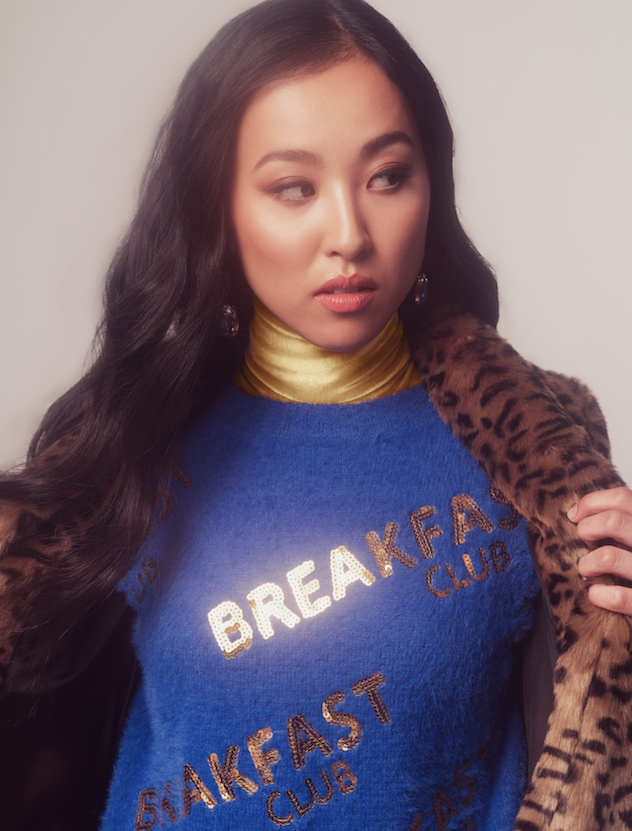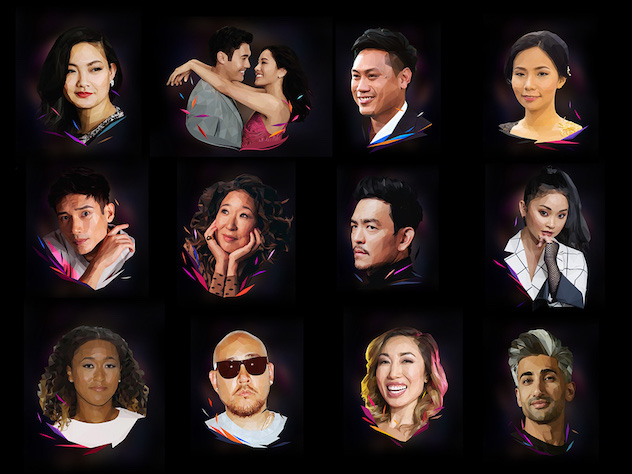Every morning, Lyrica Okano wakes up at 7 a.m. She cleans, cooks a meal and gives a pep talk to her reflection in the mirror. “You can do this,” she’ll say. “It’s another day. Yesterday, we had difficulties. But today I have a feeling we can do better. If not, tomorrow is another day. You’re beautiful. You’re important. You’re kind. You deserve the world. Go for it.”
For Okano, this daily ritual serves a few purposes, the first being to give her day a sense of routine, which isn’t uncommon for world-class athletes. Before embodying girl-crush queen Nico Minoru in Hulu’s Marvel series “Runaways,” she had been so good at rhythmic gymnastics that she was a member of the U.S. national team and a contender to make the Olympics.
Another reason is that there’s always room for self-improvement. Okano readily admits that her weakness has always been self-expression and that her strength has been perseverance, a quality she shares with her on-screen persona. Nico discovers her sorcerer parents are part of a criminal organization of supervillains, who become the enemies of their children. And in this amped-up inter-generational duel, these Runaways have all inherited their parents’ superpowers.

(Nolwen Cifuentes/KORE)

(Nolwen Cifuentes/KORE)
Okano’s real parents, both musicians, emigrated from Tokyo in the early ’90s, drawn to the Big Apple’s underground and punk music scene. Not long after arriving, they had their daughter and became a part of a tight-knit Japanese community in the Upper West Side. Her mom and dad found stable jobs, as an I.T. tech and a Japanese teacher, respectively. That’s how Okano grew up, going to Saturday get-togethers with the other neighborhood Japanese American kids and taking karate lessons with her friends.
As a kid, she was restless and had more energy than her parents knew what to do with. To help get it out of her system, they enrolled her in a once-a-week gymnastics class when she was 4 years old. Not long after that, a coach recognized her talent and recommended she start competing. Then when she turned 11, she quit school altogether to train eight hours a day, seven days a week. “I gave everything up,” Okano says. “My whole life revolved around gymnastics.” At 14, she made the national team, a huge achievement — but she was lonely and isolated.
When it became too much to stand, she had to quit the sport. “I realized I didn’t have any social skills,” she says. “I couldn’t look people in the eyes. I was always raised to please people and listen to what other people tell me to do.”
At the time, she struggled with the idea of belonging. In school in Manhattan, she’d been bullied as the only Asian girl in her classes. She told her parents she wanted to attend high school in Japan, where everyone looked like her. But reality was harsh: Okano’s elementary Japanese-language skills and American mannerisms set her apart in Kyoto, too, so that at the end of two years there she was just as lonely as ever. “I was an outsider. I didn’t know how to fit in,” she says. “That experience taught me that it’s not where I am, it’s who I am and how I see myself — that’s where I belong.”
Her friend Yuka Taga says Okano has always displayed an abnormal level of discipline. “Lyrica can’t half-ass anything, and she thinks that’s a problem. I was in public school, but she was already becoming a professional,” Taga, who’s also an actress, recalls. “Her parents said, ‘You’re not going to school. You have to be the best at gymnastics.’ And she really was.”
Taga and Okano go way back, to when they were both in diapers. All they did as kids was play pretend, make up stories and act out picture books. That’s translated into somewhat of a filmmaking partnership — Okano’s first producing credit was for Taga’s first short film, “Remembering Virginia,” in which Okano also acted. Just before Okano booked “Runaways,” they collaborated on another short about runaway teens.

(Nolwen Cifuentes/KORE)

(Nolwen Cifuentes/KORE)
A career in acting is a choice Okano says she made for herself, and no one else. She’s stuck with it some 10 years now. That’s meant a lot of auditions, and even more rejections, and the few odd waitressing and bartending jobs here and there. “I don’t think about what-ifs. I was in a mindset where I was telling myself, if this doesn’t work out I don’t know what I’m going to do, so this has to work. I never thought about quitting. I was just really like, ‘No, keep going. You’ll get there,’” she says.
Her hard work paid off big time two years ago, when she got the “we want you” call from Marvel, which was looking for the right actress to play the magical staff-wielding goth heroine for its latest TV series. “I blacked out, it was so bizarre,” she says, of that moment. Taga, who was in the room when the call came, remembers her friend in such a shock she had to sit down very slowly on her bed.
“Hearing from Marvel that you’re going to be a lead in their show playing a badass Japanese American role who is also bisexual — like, that doesn’t click. It still doesn’t click,” Okano says. “I’m doing interviews and I’m talking about it, but there is a huge part of me that still feels like, is this really happening? Is this my life?”
Marvel told her she had a week and a half to move to Los Angeles to shoot the pilot. The show was, of course, picked up, and the debut of the “Runaways” has thrust Okano’s Nico into the spotlight, as the de-facto head of the group, and at the center of the show’s romance arc.
In Season 1, Nico seeks solace in a relationship with fellow Runaway Alex (Rhenzy Feliz), but eventually ends up drawn to Karolina (Virginia Gardner), another member of the group. Nico and Karolina are the first openly lesbian superheroes in the Marvel Cinematic Universe. “The important thing is just to play [Nico] honestly,” Okano says. “She’s just a girl who likes another girl. Also, she’s liked a boy before. It’s just another love story.”
Nico’s arc also includes the death of her sister before the events of this series, which leaves her crushed and vulnerable. And it’s why she wears the heavy makeup and dark clothing and practices Wicca — to mask the pain. It’s a backstory that doesn’t exist in the original comics, and adds a layer of tragedy to the role. In contrast to her tough demeanor, she’s one of the most emotionally fragile heroes in the Runaways.
“I was also never taught how to express,” Okano says. “As a gymnast, you’re just supposed to do your job and not complain. … So as a teenager, I would spend hours in front of the mirror doing makeup just to leave the house every day so that I could have some kind of control in my life — I felt so much like I didn’t have any control emotionally.”
In many ways, being Nico has allowed Okano to channel her innermost feelings. Josh Schwartz, one of the show’s executive producers, calls Nico the “natural leader” of the Runaways. Her delivery of the character, he says, is “complicated, fascinating and heroic.”
“Lyrica brings authenticity to Nico,” Schwartz says. “Sometimes that’s steely toughness. Other times that’s rawness and vulnerability, but without ever a false note.”
At the end of the first season, our heroes finally did their namesake diligence and ran away. The second season, set to premiere in December, puts the Runaways squarely in the middle of danger. And Nico’s got to juggle learning how to deal with her newfound powers and a new relationship, all the while confronting the truth about her family. If there’s anything we love, it’s watching that mythic journey of a hero finding her way — and so it is too with Okano, whose motto is “fall seven times, and get up eight.”
So she’ll say again into the mirror tomorrow, and the day after, and the day after that: You’re beautiful, you’re important, you’re kind, you deserve the world. Go for it.
This article appears in KORE’s December 2018 issue. Subscribe here.







